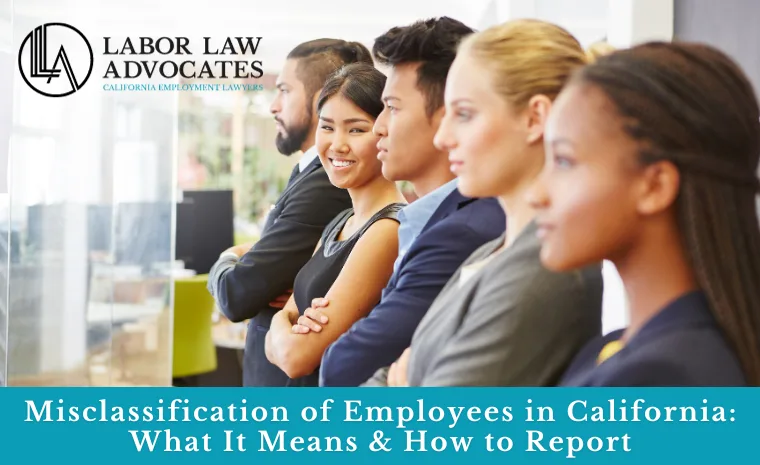Misclassification of Employees in California: What It Means & How to Report
Are you working in California and suspect that your employment status has been misclassified? Misclassification of employees is a common issue that can result in you being shortchanged of benefits and entitlements. California has specific laws in place to protect your rights.
In this blog, we’ll define employee misclassification in California, discuss rights and entitlements, share how to report misclassification, and highlight a landmark California case to shed more light on this issue.
Do you have unpaid wages because you were misclassified?
What is Employee Misclassification in California?
According to a 2000 study by the U.S. Department of Labor, 10% to 30% of audited employers had been misclassifying certain workers. Additionally, when workers who claimed to be misclassified as independent contractors underwent review, as many as 95% of them were reclassified as employees.
Misclassification of employees in California occurs when an employer wrongly categorizes you as an independent contractor instead of as a regular staff member. This can have significant consequences because employees should receive certain benefits and protections under an employee-employment relationship, which are not available to independent contractors.
California Laws on Misclassification of Employees
The following are some of the laws related to misclassified workers in California:
Minimum Wage
California has a minimum wage law, and employees are entitled to at least this rate for every hour worked. Starting January 1, 2024, employees are set to receive at least $16 per hour. Certain cities and counties have set minimum wages that surpass the state’s minimum wage.
State law mandates that no employee should ever accept compensation below the minimum wage. The responsibility for ensuring that employees receive this amount falls entirely on the employer, and this obligation cannot be waived through any form of agreement, including collective bargaining agreements.
Unfortunately, those who are filed under independent contractor status aren’t protected by this law.
Overtime Pay
Employees should receive overtime pay for any hours worked beyond the regular workweek or workday. California’s Overtime Law states that if you’re a non-exempt employee aged 18 or older, or a minor employee aged 16 or 17 who isn’t required to attend school and isn’t prohibited by law to work, you should not work more than eight hours in a single workday or more than 40 hours in a workweek.
If you do, you should receive one and a half times your regular pay rate for those extra hours in a workday or beyond 40 hours in a workweek (or double pay in specific cases).
However, some overtime rules don’t apply to certain employee classifications. There are special rules that govern overtime pay for specific groups of employees, such as those working in the healthcare and agricultural sectors. For example, nurses cannot be forced to work overtime unless it is necessary due to emergency circumstances, such as a natural disaster.
Meal and Rest Breaks
Employees in California are entitled to meal and rest breaks. Meal and Rest Break Law states that an employer may not employ someone for a period of more than five hours per day without providing a meal period of not less than thirty minutes. The exception is that if the total work period per day is no more than six hours, the meal period may be waived by mutual consent.
A second meal break of not less than thirty minutes is required if an employee works more than ten hours per day. The exception is that if work to be rendered is under 12 hours, the second meal break may be waived by mutual consent and only if the first meal break was not waived.
Those misclassified as independent contractors might not receive these types of breaks at all.
Workers’ Compensation
Employees have the right to workers’ compensation benefits if injured on the job, while independent contractors usually do not.

Common Misclassification Violations
Misclassification violations in California can take various forms and often involve employers improperly listing employees as independent contractors. Here are some common examples:
- Employee status as an independent contractor: If an employer labels a worker as an independent contractor but exerts significant control over their work, including setting their schedule and providing equipment, this may be a violation.
- Failure to pay minimum wage: Misclassified employees may not receive the legally required minimum wage. Employers must pay at least the state or local minimum wage, even if a worker is misclassified.
- Unpaid overtime: Misclassified employees may not receive overtime pay when they work more than eight hours in a day or 40 hours in a week. Overtime violations occur when employers fail to provide this additional compensation and may be tagged as unpaid wages.
- Denial of meal and rest breaks: California law mandates meal and rest breaks for employees, but not for independent contractors. Misclassified workers often face violations if they are denied these breaks.
- Lack of workers’ compensation coverage: Employers are required to provide workers’ compensation insurance. Misclassified independent contractors may not have access to this vital protection.
- No reimbursement of business expenses: Employers typically must reimburse employees for work-related expenses. Misclassified workers may not receive this reimbursement.
- Exclusion from employee benefits: Misclassified employees may be denied the usual benefits such as health insurance, retirement plans, and paid time off.
- No entitlement to unemployment benefits: Independent contractors generally do not qualify for unemployment benefits, leaving misclassified employees without this safety net.
- No right to family and medical leave: Misclassified staff may be denied the protections of the Family and Medical Leave Act (FMLA) and the California Family Rights Act (CFRA), which provide job protection and leaves.
- Wrongful termination claims: When misclassified workers are fired, they may not have the legal rights and protections against wrongful termination.
These are just a few examples of the types of misclassification violations that can occur in California. Workers must be aware of their rights and report any classification issues to the authorities to seek proper classification and receive the benefits and protections they are entitled to.
Were you misclassified by your employer?
High-Profile California Misclassification Cases
Here are two of the most notable cases related to misclassification of employees in California. Both led to lawsuits and helped workers receive justice.
California vs Uber and Lyft
In 2020, the state filed an employee misclassification lawsuit against these ride-sharing giants, alleging that they misclassified their drivers as independent contractors rather than as employees. This legal action affects over one million gig workers in California who stand to gain access to benefits such as a minimum wage and unemployment insurance — benefits usually withheld from independent contractors.
Furthermore, the lawsuit asserts that these ride-hailing companies are engaging in unfair business practices that harm other California businesses. Uber and Lyft allegedly evade payroll taxes and fail to pay minimum wage, allowing them to offer rides at artificially low prices and, thus, gaining an edge over other businesses.
The ongoing legal battle seeks civil penalties and back wages for workers, and the potential sum could reach hundreds of millions of dollars.
Dynamex Operations West Inc. vs California Supreme Court
Dynamex, a company providing same-day delivery services, decided to reclassify its delivery workers as independent contractors, with the goal of reducing labor costs and saving money. This change led two drivers to consult with employment lawyers and file a lawsuit.
In a unanimous decision, the California Supreme Court established that workers are presumed to be drivers under California’s wage orders, placing the burden on the hiring entity to demonstrate that a worker is an independent contractor exempt from wage order protections.
The Court further outlined the “ABC test,” which requires the hiring entity to satisfy all three prongs of the test to establish independent contractor status. After applying the new test to Dynamex and its staff, the Court determined that there was sufficient common interest among the driver class regarding parts B and C of the test. This led to the affirmation of the class certification issued by the California Court of Appeal.
In January 2021, the Supreme Court ruled that the Dynamex decision has retroactive application, in accordance with the California wage and hour laws, providing benefits to workers.
How to Report Misclassification in California
If you believe you believe there has been willful misclassification or other labor law violations by your employer, take immediate action. Here’s what you can do:
- Understand the law: Educate yourself about the California labor laws and regulations regarding employee classification. You may check the Labor Commissioner’s Office website to read about employers’ responsibilities under the California labor code.
- Review your employee status: Evaluate your work arrangement and determine if it meets the criteria set by AB5 (the ABC test) to be classified as an employee. This includes factors like control, dependency on the hiring entity, and the nature of your work.
- Gather evidence: Collect any evidence that supports your claim of being misclassified, such as employment contracts, pay stubs, work schedules, job descriptions, or any communication with your employer regarding your classification.
- Preserve records: Maintain a record of all relevant documents, including pay stubs, timesheets, contracts, and any communication with your employer regarding your status. These records can be crucial evidence.
- Talk to your employer: Start by discussing your concerns with your employer. They might not be aware of the misclassification and could rectify the situation.
- File a complaint: You can file a complaint with the California Labor and Workforce Development Agency (LWDA) the Division of Labor Standards Enforcement (DLSE).
- Get legal advice: Seek legal counsel from an employment attorney experienced in California labor laws and misclassification cases.
- File a complaint: Depending on the labor violations you experienced, you may need to file a formal complaint with the appropriate agency. If you are seeking wage and hour protections, you can file a complaint with the California Division of Labor Standards Enforcement (DLSE). If you believe there has been misclassification for tax purposes, you can report it to the California Employment Development Department (EDD).
- Consider a class-action lawsuit: If you believe that there are other similarly misclassified employees in your workplace, you may want to explore the possibility of joining or initiating a class action lawsuit against your employer.
Remember, it is best to consult with a qualified employment law attorney who can advise you based on your specific circumstances and provide you with the most accurate and up-to-date information regarding misclassification in California employment.
Conclusion
Employee misclassification is a serious issue that can deprive you of essential benefits and rights as a worker in California. If you believe you’ve been misclassified, take action now and protect your rights by reaching out to an employment lawyer for guidance. Your rights matter, and with the right support, you can seek the justice and benefits you deserve.
Labor Law Advocates is a trusted resource that can provide you with the help you need to navigate the legal process. Call us today at (424) 688-3632 and take the first step toward resolving your misclassification issue.




